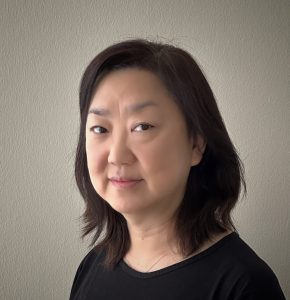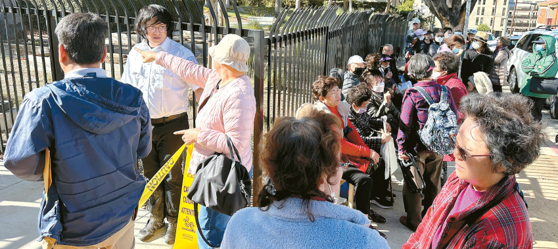
By Nicole Chang
The author is a Metro/City news reporter for the Korea Daily.
Kim, a 70-year-old resident of a low-income apartment complex in Westlake, fell ill with the flu after spending an entire night in line earlier this month. Kim had stayed up all night to get an application to move into Miramar Towers, a senior apartment complex at Alvarado and 3rd Street.
“I didn’t realize the line was that long, and after lunch, I just put on a sweater and left, but I got impatient and kept waiting, not knowing that I would end up spending the night,” Kim said.
“I was worried that if I left my spot and got pushed back in line, they would run out of application papers and I wouldn’t get one,” Kim added.
Kim and other Korean-American seniors, dressed only in thin sweaters or jackets due to the daytime warmth, found themselves shivering in the cold as temperatures dropped after sundown, unable to leave their spot in line.
Kim’s greatest challenge was accessing a restroom. Having left her cell phone at home, she had no means to call for assistance. Fortunately, a neighbor walked down the street, and Kim asked for help, enabling her to use the restroom and change her clothes. However, her cystitis recurred, requiring her to take antibiotics.
The all-night queue of seniors occurred because the Miramar Towers management restricted the distribution and acceptance of applications to office visitors only.
On November 20, the first day of distribution, more than 100 seniors reportedly lined up on the street overnight to pick up applications. The overnight line disappeared after two to three days, but the daytime line continued for a while.

As the manager’s office closed for lunch, seniors aged between 70 to 80 were compelled to forgo meals and wait under the hot sun on the street. A senior applicant from Orange County recounted, “I made the effort to visit the office, only to be turned away with the message, ‘We are not handing out applications today, so come back tomorrow.’ I felt even more upset because I don’t speak English.”
“Honestly, I wondered if I was in the United States,” said Dae Joong Yoon, president of Ktown Action, who came to the aid of the Korean-American seniors after hearing their stories. “The applications did not have numbers on them either for priority or limited quantity, and I was so outraged that they were just handing out photocopied applications and making the seniors wait on the street all night.”
Ktown Action was then able to get in touch with the apartment management company and arrange for applications to be distributed within Koreatown, but there was no guarantee what would have happened if no one had paid attention.
Still, many Korean seniors continue to confront injustices and challenges that remain unreported. One of the most problematic issues is that government agencies do not provide Korean interpretation or translation services. For instance, some seniors eligible for the Section 8 Voucher were unable to proceed due to their inability to comprehend the necessary documents in English. Others seeking help with an unfair eviction have been turned away when the Housing Authority of the City of Los Angeles (HACLA) said they could not provide a Korean interpreter.
A known issue is that numerous senior apartments, despite having a significant Korean-American resident population, lack Korean-speaking managers, and therefore do not receive adequate help. One example is Angelus Plaza, which reportedly has more than 800 Korean-American residents, but the manager does not speak Korean.
A senior resident shared a personal grievance: “My neighbor would wash his underwear, dry them in the hallway, and leave his door open. Despite my complaints to the management, no action was taken,” adding, “It made me mentally distressed, and I’m taking depression medication now.”
With the growing political and economic influence of the Korean-American community, it becomes increasingly important for mainstream society to recognize and address these issues. It is time to start protecting the rights of Korean-American seniors. There is a pressing need for government and public institutions to enhance and fortify policies, ensuring the provision of Korean language interpretation and assistance services for Korean-American seniors. Korean-American seniors deserve a safe and dignified retirement.




